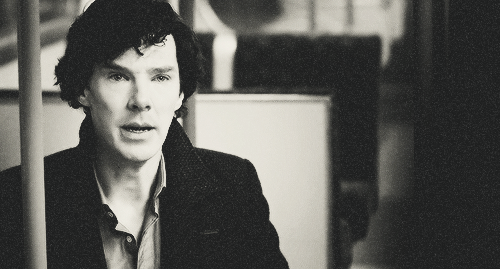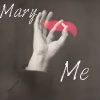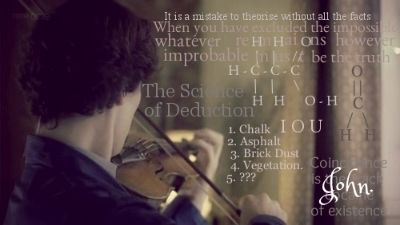
BBC Sherlock Fan Forum - Serving Sherlockians since February 2012.
- Lily
- Official Blogger
 Offline
Offline 
- Registered: February 21, 2013
- Posts: 1,353
Re: Sherlock's habits
holmes23 wrote:
Quoting Moffat:
"There's a character detail in there that we've only ever really hinted at, as he checks out the mirror quite a lot. So while he says I'm above all such matters, he has the attitude that 'I have no interest in women, but by God they better have an interest in me'"
I've been a bit surprised when reading this because I can't actually recall him doing that. It is obvious that his appereance matters to him, hence his dressing choices. And he has at least two mirrors in his own room and the one in the living room. But when do we actually see him look at a mirror? In TRF when he buttons his jacket and later requested by John ('the face') - but apart from that?
Or does 'we've only ever really hinted at' mean that it is implied without having it really shown on the show?
--------------------------------

"Yes, of course I forgive you."
- Be
- Unregistered
Re: Sherlock's habits
butterfly grl wrote:
He does take a mince pie from Mrs. Hudsons fridge and eat it (speaking with his mouth full!) while getting The Womans phone from her.
1. Multitasking
Yes. This is obviously a habit: Doing several things simultaneously. Sending one text message to several recipients. Doing something with his right hand and something else with his left hand. Can be a useful habit.
2. Mirrors
Interesting that Mr Moffat talks about mirrors. I am not sure whether this little hint is only about Sherlock's outfit and his interest in his own appearance. I share your opinion that Sherlock is aware of his perception. John makes fun of that in The Hounds when he mentions the coatcollar. In TBB after the fight with the swordsman Sherlock looks down and brushes his jacket.
I am a bit suspicious that Mr Moffat talks about mirrors to give a clue and to hint towards Sherlock's awareness of his perception in general.
We see a lot of mirrors in "Sherlock". In almost every room we can find one. It is not something that is done accidentally, IMO. Especially when you consider the difficulties to film with mirrors in a room.
Reflections and mirror images appear quite often. We even see through a mirror or a screen sometimes. In Scandal when Sherlock opens the safe we are at the other side of the mirror/safe or when John looks at his laptop and he looks at us.
This playing with mirrors and metaphors is something I like very much because the boundaries and limitations vanish and look interchangeable. This effect also appears when we see text on screen. When we see with Sherlock's eyes it appears as if we are suddenly Sherlock and the screen is totally gone.
- anjaH_alias
- Mycroft's Contact
 Offline
Offline - Registered: November 13, 2012
- Posts: 434
Re: Sherlock's habits
Lily wrote:
holmes23 wrote:
Quoting Moffat:
"There's a character detail in there that we've only ever really hinted at, as he checks out the mirror quite a lot. So while he says I'm above all such matters, he has the attitude that 'I have no interest in women, but by God they better have an interest in me'"I've been a bit surprised when reading this because I can't actually recall him doing that. It is obvious that his appereance matters to him, hence his dressing choices. And he has at least two mirrors in his own room and the one in the living room. But when do we actually see him look at a mirror? In TRF when he buttons his jacket and later requested by John ('the face') - but apart from that?
Or does 'we've only ever really hinted at' mean that it is implied without having it really shown on the show?
Funny. My feeling says he´s looking quite often into a mirror. Without checking that I just remember - besides that scene in TRF - the scene in TBB, when he straightens his jacket after the fight with that Indian man in the beginning. And, indirectly, when he choses his disguise for Irene Adler (we don´t see the mirror but obviously he is looking into one). But I never doubted about him being a somehow vain character.
Last edited by anjaH_alias (June 5, 2013 12:18 pm)
- besleybean
- Threatened Knighthood
 Offline
Offline 
- From: Carnoustie, Angus, Scotland.
- Registered: October 4, 2012
- Posts: 21,380
Re: Sherlock's habits
I don't think he's vain at all, just neat and tidy.
---------------------------------------------------------------------------------------------------------------------------------------------------------------
- Be
- Unregistered
Re: Sherlock's habits
He likes to be dramatic, to perform. He likes to have an audience. In canon Watson mentioned that Holmes can easily be flattered and he likes to hear compliments about his work.
I wouldn't go as far as to call it vain, but he is proud when he can win or solve a puzzle. IMO, vain is defined as character trait of a person who is excessively proud of one's appearance or accomplishments, but lacking substance.
Sherlock knows that he can use his appearance and his acting skills. Perhaps you can compare it with an artist or an actor on stage. He does it because he knows he is good at it; he wants to impress (us/John) and he enjoys the moment.
- Davina
- Moderator
 Offline
Offline 
- From: The Only Way is Essex UK
- Registered: February 9, 2012
- Posts: 9,714
Re: Sherlock's habits
I think vanity is synonymous with conceit. It is possible to be vain, or conceited, with just cause. There is no requirement for it to be without substance. There are people who are very physically attractive/ highly accomplished who are also terribly vain (thinking of Carly Simon's song 'You're so Vain').
However, the use of the word 'vain' can also be used in another context e.g. 'it was a vain attempt to do something' as in it was futile or pointless.
![]()
---------------------------------------------------------------------------------------------------------------------------------------------
Don't make people into heroes John. Heroes don't exist and if they did I wouldn't be one of them.

- anjaH_alias
- Mycroft's Contact
 Offline
Offline - Registered: November 13, 2012
- Posts: 434
Re: Sherlock's habits
Davina wrote:
I think vanity is synonymous with conceit. It is possible to be vain, or conceited, with just cause. There is no requirement for it to be without substance. There are people who are very physically attractive/ highly accomplished who are also terribly vain (thinking of Carly Simon's song 'You're so Vain').
However, the use of the word 'vain' can also be used in another context e.g. 'it was a vain attempt to do something' as in it was futile or pointless.
I looked it up in the internet, obviously I have chosen the wrong word. Of course I am not talking about lacking substance or being superficial. I am just talking about somebody who is looking for his outer appearance (like also canon Holmes and not in an excessive way). I just rewatched the Reichenbach Falls two days ago and saw, that he is more than once watching himself in the mirror and checking his outfit (e.g. before John and him drive to the trial). The other word given to me from the dictionary is "pavonine" - maybe this fits better? Our German word "eitel" is of course not a real positive one, but also not soooo bad: somebody can be clever, a nice guy, skilful and a genius plus "eitel", too. It´s not a contradiction.
Last edited by anjaH_alias (June 7, 2013 12:00 pm)
- Davina
- Moderator
 Offline
Offline 
- From: The Only Way is Essex UK
- Registered: February 9, 2012
- Posts: 9,714
Re: Sherlock's habits
Pavonine is used very rarely, so rarely in fact that I had never heard of it. It really relates to being a peacock so will suggest gaudiness as much as vanity. Certainly, in the past people would have referred to men as being like a peacock I.e. dressed gaudily etc. I feel that it is used much less nowadays.
Eitel definitely has a more negative meaning that vain in English. To get the same meaning you would have to say something along the lines of: he is vain about his appearance. The word 'pretentious' gives a much better feel in English because it suggests that there is an unjustified arrogance or pride.
![]()
---------------------------------------------------------------------------------------------------------------------------------------------
Don't make people into heroes John. Heroes don't exist and if they did I wouldn't be one of them.

- Mary Me
- High Functioning Sociopath
 Offline
Offline 
- From: Germany, Bonn
- Registered: January 8, 2013
- Posts: 3,250
Re: Sherlock's habits
Davina wrote:
Pavonine is used very rarely, so rarely in fact that I had never heard of it. It really relates to being a peacock so will suggest gaudiness as much as vanity. Certainly, in the past people would have referred to men as being like a peacock I.e. dressed gaudily etc. I feel that it is used much less nowadays.
Eitel definitely has a more negative meaning that vain in English. To get the same meaning you would have to say something along the lines of: he is vain about his appearance. The word 'pretentious' gives a much better feel in English because it suggests that there is an unjustified arrogance or pride.
And so I've also learned something new. Thanks Davina! ![]()
~~~~~~~~~~~~~~~~~~~~~~~~~~~~~~~~~~~~~~~~~~
"Falling is just like flying, except there’s a more permanent destination."
"Sherlock Holmes is a great man, and I think one day—if we’re very very lucky—he might even be a good one."
"Would you like to-"
"-have dinner?"
"-solve crimes?"
"Oh"

- tonnaree
- The "B" is SILENT! (Mod)
 Offline
Offline 
- From: Atlanta, Georgia, USA
- Registered: May 31, 2013
- Posts: 9,270
Re: Sherlock's habits
Snogging John when he finds a clue!
oh no, wait, that's just in my head.
----------------------------------------------------------------------
Proud President and Founder of the OSAJ.
Honorary German
"Anyone who takes himself too seriously always runs the risk of looking ridiculous; anyone who can consistently laugh at himself does not".
-Vaclav Havel
"Life is full of wonder, Love is never wrong." Melissa Ethridge
I ship it harder than Mrs. Hudson.


- anjaH_alias
- Mycroft's Contact
 Offline
Offline - Registered: November 13, 2012
- Posts: 434
Re: Sherlock's habits
Davina wrote:
Pavonine is used very rarely, so rarely in fact that I had never heard of it. It really relates to being a peacock so will suggest gaudiness as much as vanity. Certainly, in the past people would have referred to men as being like a peacock I.e. dressed gaudily etc. I feel that it is used much less nowadays.
Eitel definitely has a more negative meaning that vain in English. To get the same meaning you would have to say something along the lines of: he is vain about his appearance. The word 'pretentious' gives a much better feel in English because it suggests that there is an unjustified arrogance or pride.
Thanks for that, "pretentious" sounds good.

